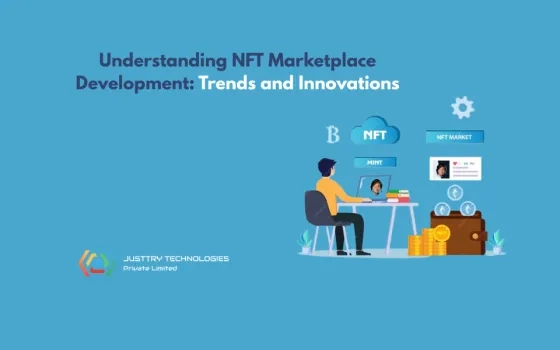In today’s increasingly digital world, cybersecurity has become a primary concern for businesses, governments, and individuals. With the rise of cyberattacks, data breaches, and privacy violations, finding robust solutions to protect sensitive information is more important than ever. Blockchain technology, which is often associated with cryptocurrencies, is emerging as a powerful tool in cybersecurity. By enhancing data protection, ensuring privacy, and preventing hacking attempts, blockchain is proving to be a game-changer in the fight against cybercrime.
This article explores the role of blockchain development solutions in cybersecurity, explaining how it works, its applications in different sectors, and how it can help organizations secure their digital assets.
What is Blockchain Technology?
Blockchain technology is a decentralized digital ledger that records data across multiple computers or nodes. Each record, known as a "block," is securely linked to the previous one, forming a chain of data that is virtually tamper-proof. This decentralized structure ensures that no single entity has control over the entire system, making it more resistant to manipulation and cyberattacks.
Although blockchain is widely known for supporting cryptocurrencies like Bitcoin, its applications extend beyond digital currencies. Today, businesses and governments across various sectors are exploring blockchain to enhance cybersecurity, reduce fraud, and protect sensitive data.
Blockchain and Cybersecurity: How They Work Together
1. Enhanced Data Privacy and Integrity
One of the most significant benefits of blockchain technology is its ability to ensure data privacy and integrity. Unlike traditional centralized systems, blockchain operates on a decentralized network, where information is encrypted and stored across multiple nodes. This makes it highly secure, as any attempt to alter data on one node is immediately noticeable by the rest of the network.
Each transaction or data entry is verified by the participants in the blockchain network, and once it is recorded, it becomes immutable. This ensures that sensitive data cannot be tampered with or erased, making blockchain an ideal solution for protecting information in sectors like healthcare, finance, and government, where data privacy is critical.
2. Protection Against Data Breaches
Data breaches have become a growing threat in the digital age, with hackers constantly targeting centralized servers that store large amounts of sensitive data. In a traditional system, once a hacker gains access to the central server, they can manipulate or steal the data.
Blockchain technology offers a solution by decentralizing data storage. In a blockchain network, data is distributed across multiple nodes, and each node holds a copy of the data. This makes it incredibly difficult for hackers to access the entire system or modify information, as they would need to compromise a majority of the nodes simultaneously.
For industries that handle sensitive data, such as banking or healthcare, blockchain’s ability to decentralize data storage significantly reduces the risk of breaches and ensures that information remains secure.
3. Secure Transactions and Payments
Blockchain technology is known for its role in securing digital currency transactions. With blockchain, every transaction is recorded on a public ledger, ensuring transparency and preventing fraud. Once a transaction is added to the blockchain, it is cryptographically sealed and cannot be altered or reversed.
In addition to cryptocurrencies, blockchain is being used to secure other types of transactions, such as payments, contracts, and asset transfers. By eliminating intermediaries and relying on a decentralized system, blockchain reduces the risk of fraud, ensures the accuracy of transactions, and enhances security.
Blockchain’s Role in Enterprise Cybersecurity
1. Enterprise Blockchain Solutions
Large organizations are increasingly turning to blockchain technology to bolster their cybersecurity defenses. Traditional methods of securing data, such as firewalls and encryption, are no longer sufficient to protect against advanced cyber threats. Blockchain offers a more robust solution by ensuring that data is stored and transmitted securely across a decentralized network.
Blockchain is particularly beneficial for enterprises that need to handle large amounts of sensitive data or deal with complex transaction systems. By using blockchain, companies can ensure that their data is protected from tampering, fraud, and unauthorized access.
2. Blockchain for Identity Management
One of the most important applications of blockchain in cybersecurity is in identity management. Identity theft is a growing concern, with cybercriminals using stolen personal data to commit fraud or gain unauthorized access to systems.
Blockchain technology offers a secure, decentralized way to manage and verify digital identities. With blockchain, individuals can store their personal information on a blockchain, where it is encrypted and only accessible to authorized parties. This ensures that sensitive data, such as social security numbers or medical records, remains secure and protected from theft.
Additionally, blockchain-based identity management systems can provide greater control to users over their personal information, allowing them to selectively share data with trusted parties.
Key Benefits of Blockchain in Cybersecurity
1. Decentralization and Reduced Risk of Single Point of Failure
One of the primary benefits of blockchain technology is its decentralized nature. In traditional centralized systems, if a central server is compromised, the entire system can be at risk. With blockchain, there is no single point of failure, as data is stored across multiple nodes.
This decentralization significantly reduces the risk of cyberattacks and ensures that even if one part of the network is compromised, the data remains secure across the rest of the system.
2. Immutable and Transparent Records
Blockchain’s ability to create immutable records is another major advantage for cybersecurity. Once data is added to the blockchain, it cannot be altered or deleted. This feature is invaluable for creating transparent and auditable records of transactions or activities.
In the event of a security breach, blockchain provides a clear audit trail, making it easier to identify the source of the attack and mitigate future risks. For industries that require strict regulatory compliance, blockchain’s transparency and immutability make it an ideal solution for maintaining secure records.
3. Secure Smart Contracts
Smart contracts are self-executing contracts with the terms of the agreement directly written into code. These contracts automatically execute transactions when predefined conditions are met, reducing the need for intermediaries and minimizing the risk of fraud.
By leveraging blockchain technology, smart contracts are stored on a decentralized network, making them tamper-proof and secure. This ensures that both parties involved in a transaction can trust that the contract will be executed as agreed without the need for a third party to enforce it.
Blockchain and Cybersecurity in the Future
As the digital landscape continues to evolve, the need for stronger cybersecurity solutions will only grow. Blockchain technology has the potential to revolutionize cybersecurity by providing a decentralized, transparent, and immutable way to protect data and secure transactions.
In the future, blockchain could be integrated into a wide range of cybersecurity applications, from securing cloud computing and IoT devices to protecting critical infrastructure and digital identities. The versatility and robustness of blockchain make it a powerful tool for combating cybercrime and safeguarding digital assets.
Conclusion
Blockchain technology is playing an increasingly important role in cybersecurity by providing enhanced data privacy, protection against breaches, and secure transactions. Its decentralized nature and immutable ledger make it an ideal solution for businesses and governments looking to protect sensitive data and prevent cyberattacks.
By adopting blockchain, organizations can create more secure systems, protect digital identities, and automate processes through smart contracts. As blockchain continues to evolve, its impact on cybersecurity will only grow, providing businesses with a powerful tool to safeguard their digital infrastructure and ensure data integrity.




















